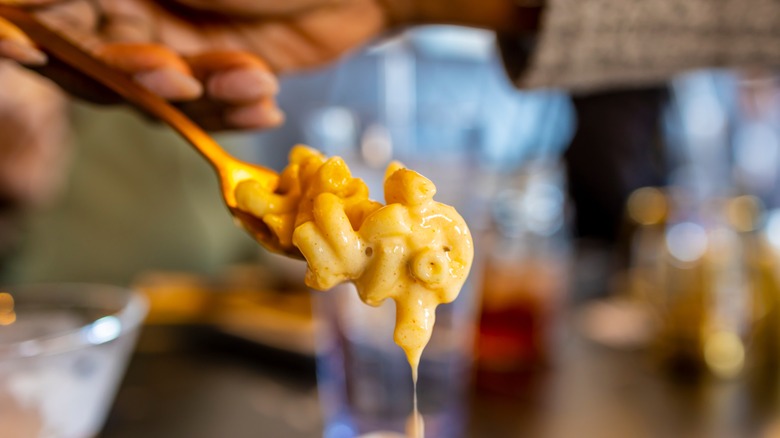Is Your Mac & Cheese Gritty? This Is The Hidden Culprit
Macaroni and cheese is one of those comfort foods that just about everyone enjoys. Even immortal composer Ludwig van Beethoven had a penchant for the dish, though he paid a high price for his love of mac and cheese, as the ingredients were expensive to come by in his day. Today, we can score a quick-cook box for less than a dollar and have it prepared and plated in under 15 minutes. Nothing beats homemade, though, and it's often worth taking the time to make it from scratch. Alas, home-cooked mac and cheese can quickly go wrong. For instance, even the best mac and cheese recipe can end up with a mysterious — and most undesirable — gritty texture.
Joanne Gallagher, recipe creator and co-founder of Inspired Taste, pinpointed why even the most carefully prepared homemade mac sauce can end up with a consistency more like grainy sand than creamy deliciousness: pre-shredded bagged cheese. "Prepackaged shredded cheese is often coated with anti-caking agents like cellulose, which prevent the cheese from sticking together in the bag," she shared with Food Republic. "Unfortunately, these additives also stop the cheese from melting completely smoothly, causing a gritty or grainy texture in your cheese sauce."
Other tips for a well-melted mac and cheese sauce
That powdered substance on shredded cheese can be your worst nemesis when trying to execute a melty, creamy sauce. While using packaged shreds can certainly be a time saver, Joanne Gallagher recommended the old-school method. "The best option is to use freshly grated cheese from a block instead of pre-shredded cheese," she instructed. "Grating your own cheese means it melts evenly into the sauce, giving you a smooth, glossy finish every time."
The type of cheese you use is also an important factor in churning out a yummy sauce that's creamy and not gritty. Aged cheeses and those with low moisture content don't melt well, such as hard cheeses like Parmigiano Reggiano, so you should avoid making them the primary component in your sauce. Apply your grater to ones with high fat and moisture content instead. Gruyere, Monterrey Jack, and baby Swiss are some good options.
And what if pre-shredded cheese is all you have to work with? Are you doomed to either skip making the dish, run to the store, or endure a grainy sauce? Not necessarily. Social media has been abuzz with the notion of washing off the anti-caking agents found in bagged shreds. The good news is that washing shredded cheese doesn't seem to have much of an impact on its usability or meltability. Be sure to use cold water, so you don't melt any. Rinse your shreds in a fine mesh strainer so that as much water as possible drains away. Then, pat them dry and let them hang out on paper towels until thoroughly dry. Use any washed cheese immediately, as it is prone to molding if stored.


